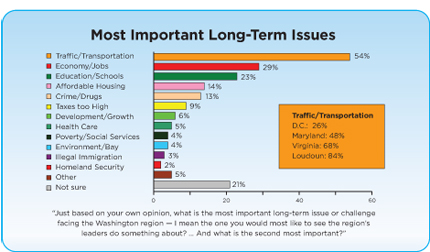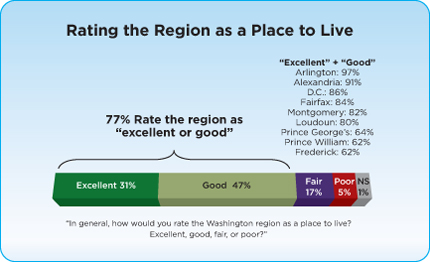Washington, D.C. – A major new survey of area residents from the Metropolitan Washington Council of Governments (COG) indicates that schools, safe streets, good jobs, and access to health care are the leading priorities to which residents want their tax dollars allocated. Findings from the comprehensive survey, Priorities for a Growing Region, which were presented at a press conference Friday, also show that residents view transportation, education, and the economy as the most important long-term issues facing the region.
“The individual jurisdictions across our region have unique personalities and needs. This survey examines some of those differences,” said Sharon Bulova, Greater Washington 2050 Chairman and Fairfax County Board of Supervisors Chairman. “But what sets this effort apart is the identification of ideas that are held in common by citizens all across the region, areas where they are urging greater regional effort to make this a better place to live for years to come.”
Greater Washington 2050 commissioned this public opinion survey to understand residents’ priorities and aspirations for the future of the region. The survey reveals area residents’ connection to the region and indicates where they want the most emphasis by regional leaders over the coming decades. Key findings of the survey include:
- The public has a clear set of priorities for the future, led by quality schools and safe neighborhoods. First among these priorities is producing high quality schools. It is the most urgent of the sixteen items tested. There are enormous differences from jurisdiction to jurisdiction within the region about how residents rate the performance of their public schools today. But even in high-performing school districts, most residents want to increase the attention their schools receive. The second leading priority for the long term is ensuring safe streets and neighborhoods. There is nearly region-wide consensus that public safety is a high priority. Rounding out the public’s leading priorities are: good jobs for everyone who wants one, better access to health care, more help for people in need, fostering a cleaner environment, making housing more affordable, and better planning for growth and development.
- While traffic is the leading long-term issue, it is not where the public would place the most resources. By a large margin, traffic and transportation are listed as the top long-term challenges facing the region. The concern is particularly acute in parts of Northern Virginia. However, when asked how much of a priority they would place on transportation if they were making decisions for the region, residents rank transportation ninth out of a list of sixteen items tested.

- The public supports more regional solutions to problems. More than 40 percent of residents would like to see more problems addressed at the regional scale. This figure rises even higher among people who want specific priorities addressed such as housing and the economy.
- The region’s residents are connected and engaged. Seventy percent of residents said they felt a strong connection to the region, while 77 percent rated the region as an excellent or good place to live. Nearly all residents actively seek information about happenings in the region through television, radio, newspapers, or online sources. Almost four in ten have contacted an elected official or attended a local public meeting in the past year.

- Residents appreciate the region as vibrant, diverse, and green. As residents envision the type of region they want to leave for their children and grandchildren, they hope for quality schools, public safety, and good jobs. Many residents also hope this region will continue to support its cultural and ethnic diversity, vibrant arts community, equality of opportunity, and neighborhoods that are friendly and green.
- Area residents believe that some people are being left out of the region’s success, and several key shortcomings of the region seem related to poor planning. Residents give lower grades to the region on helping people in need, ensuring access to health care and good jobs, and providing housing people of all incomes can afford. Residents also gave particularly low scores to the region for how it plans for growth and development, the shortage of jobs that are easy to get to, and the lack of neighborhoods that are mixed-use and walkable.
COG established Greater Washington 2050 to improve the quality of life for Washington area residents in the next 50 years by fostering stronger regional awareness, leadership and action. Led by COG and a coalition of public, business, civic and environmental stakeholders, Greater Washington 2050 will build on what many people now believe is an opportunity for agreement on big issues of growth, transportation and the environment. Greater Washington 2050 will identify specific steps to advance regional goals, assess progress, and measure performance over the coming years.
OpinionWorks, an independent research firm, conducted the research. The firm convened four focus groups of citizens from across the region in December 2008, followed by a comprehensive regional telephone survey of 1,313 interviews in February 2009.
